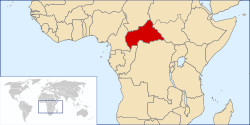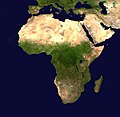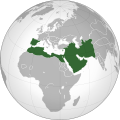Portal:Africa



Africa is the world's second-largest and second-most populous continent after Asia. At about 30.3 million km2 (11.7 million square miles) including adjacent islands, it covers 20% of Earth's land area and 6% of its total surface area. With nearly 1.4 billion people as of 2021, it accounts for about 18% of the world's human population. Africa's population is the youngest among all the continents; the median age in 2012 was 19.7, when the worldwide median age was 30.4. Based on 2024 projections, Africa's population will exceed 3.8 billion people by 2100. Africa is the least wealthy inhabited continent per capita and second-least wealthy by total wealth, ahead of Oceania. Scholars have attributed this to different factors including geography, climate, corruption, colonialism, the Cold War, and neocolonialism. Despite this low concentration of wealth, recent economic expansion and a large and young population make Africa an important economic market in the broader global context, and Africa has a large quantity of natural resources.
The continent includes Madagascar and various archipelagos. It contains 54 fully recognised sovereign states, eight cities and islands that are part of non-African states, and two de facto independent states with limited or no recognition. This count does not include Malta and Sicily, which are geologically part of the African continent. Algeria is Africa's largest country by area, and Nigeria is its largest by population. African nations cooperate through the establishment of the African Union, which is headquartered in Addis Ababa.
Africa is highly biodiverse; it is the continent with the largest number of megafauna species, as it was least affected by the extinction of the Pleistocene megafauna. However, Africa is also heavily affected by a wide range of environmental issues, including desertification, deforestation, water scarcity, and pollution. These entrenched environmental concerns are expected to worsen as climate change impacts Africa. The UN Intergovernmental Panel on Climate Change has identified Africa as the continent most vulnerable to climate change.
The history of Africa is long, complex, and varied, and has often been under-appreciated by the global historical community. In African societies the oral word is revered, and they have generally recorded their history via oral tradition, which has led anthropologists to term them "oral civilisations", contrasted with "literate civilisations" which pride the written word. African culture is rich and diverse both within and between the continent's regions, encompassing art, cuisine, music and dance, religion, and dress. (Full article...)
Selected article –

The apartheid regime in South Africa began in 1948 and lasted until 1994. It involved a system of institutionalized racial segregation and white supremacy, and placed all political power in the hands of a white minority. Opposition to apartheid manifested in a variety of ways, including boycotts, non-violent protests, and armed resistance. Music played a large role in the movement against apartheid within South Africa, as well as in international opposition to apartheid. The impacts of songs opposing apartheid included raising awareness, generating support for the movement against apartheid, building unity within this movement, and "presenting an alternative vision of culture in a future democratic South Africa."
The lyrical content and tone of this music reflected the atmosphere that it was composed in. The protest music of the 1950s, soon after apartheid had begun, explicitly addressed peoples' grievances over pass laws and forced relocation. Following the Sharpeville massacre in 1960 and the arrest or exile of a number of leaders, songs became more downbeat, while increasing censorship forced them to use subtle and hidden meanings. Songs and performance also allowed people to circumvent the more stringent restrictions on other forms of expression. At the same time, songs played a role in the more militant resistance that began in the 1960s. The Soweto uprising in 1976 led to a renaissance, with songs such as "Soweto Blues" encouraging a more direct challenge to the apartheid government. This trend intensified in the 1980s, with racially mixed fusion bands testing the laws of apartheid, before these were dismantled with the release of Nelson Mandela in 1990 and the eventual restoration of majority rule in 1994. Through its history, anti-apartheid music within South Africa faced significant censorship from the government, both directly and via the South African Broadcasting Corporation; additionally, musicians opposing the government faced threats, harassment, and arrests. (Full article...)
Featured pictures –
Did you know (auto-generated) -

- ... that the Phoenixonian Institute was the first African-American high school in California?
- ... that in 1888, Edward P. Duplex became the first African American to be elected a mayor in California?
- ... that Muhsin Hendricks of South Africa has been described as "the world's first openly gay imam"?
- ... that in 2022, Four Hundred Souls: A Community History of African America was a finalist for both an Andrew Carnegie Medal for Excellence in Nonfiction and an Audie Award for Multi-voiced Performance?
- ... that during the First World War the East African Mounted Rifles sometimes painted stripes on their horses to camouflage them as zebras?
- ... that The Red Moon was the first Broadway show to depict alliances between African Americans and Native Americans?
Categories
Selected biography –
Muhammad Anwar es-Sadat (25 December 1918 – 6 October 1981) was an Egyptian politician and military officer who served as the third president of Egypt, from 15 October 1970 until his assassination by fundamentalist army officers on 6 October 1981. Sadat was a senior member of the Free Officers who overthrew King Farouk I in the Egyptian Revolution of 1952, and a close confidant of President Gamal Abdel Nasser, under whom he served as vice president twice and whom he succeeded as president in 1970. In 1978, Sadat and Menachem Begin, Prime Minister of Israel, signed a peace treaty in cooperation with United States President Jimmy Carter, for which they were recognized with the Nobel Peace Prize.
In his 11 years as president, he changed Egypt's trajectory, departing from many political and economic tenets of Nasserism, reinstituting a multi-party system, and launching the Infitah economic policy. As President, he led Egypt in the Yom Kippur War of 1973 to regain Egypt's Sinai Peninsula, which Israel had occupied since the Six-Day War of 1967, making him a hero in Egypt and, for a time, the wider Arab World. Afterwards, he engaged in negotiations with Israel, culminating in the Camp David Accords and the Egypt–Israel peace treaty. (Full article...)
Selected country –
 |
 |
|

| ||
The Central African Republic (CAR, French: République Centrafricaine IPA: /ʀepyblik sɑ̃tʀafʀikɛn/ or Centrafrique /sɑ̃tʀafʀik/) is a landlocked country in Central Africa. It borders Chad in the north, Sudan in the east, the Republic of the Congo and the Democratic Republic of the Congo in the south, and Cameroon in the west. Most of the CAR consists of Sudano-Guinean savannas but it also includes a Sahelo-Sudanese zone in the north and an equatorial forest zone in the south.
Since most of the territory is located in the Ubangi and Shari river basins, the French called the colony it carved out in this region Ubangi-Shari, or Oubangui-Chari in French. The colony became a semi-autonomous territory of the French Community in 1958 and then an independent nation on 13 August 1960. The first fair democratic elections, held in 1993, brought Ange-Félix Patassé to power. Patassé was overthrown by French-backed General François Bozizé in 2003, who won a democratic election in May 2005 and remains in power today. (Read more...)
Selected city –
Bouaké (or Bwake, N’ko: ߓߐ߰ߞߍ߫ Bɔ̀ɔkɛ́) is the second-largest city in Ivory Coast, with a population of 740,000 (2021 census). It is the seat of three levels of subdivision—Vallée du Bandama District, Gbêkê Region, and Bouaké Department. The city is located in the central part of Ivory Coast about 50 kilometres (31 mi) northeast of Lake Kossou, the country's largest lake. It is approximately 350 kilometres (220 mi) north of Abidjan on the Abidjan-Niger Railway and about 100 kilometres (62 mi) northeast of Yamoussoukro, the capital of the country. (Full article...)
In the news
- 23 June 2025 – Somali Civil War
- At least seven Ugandan Armed Forces personnel are confirmed killed by Al Shabaab following a three-day siege on Sabiidd-Anole in the Lower Shabelle region of Somalia amid ongoing operations against the militant group. The soldiers were part of the African Union Support and Stabilization Mission in Somalia, tasked with countering Al-Shabaab. (Garowe Online) (The Defense Post)
- Child soldiers in Somalia
- The United Nations formally removes Somalia from its annual register of nations that enlist and deploy child soldiers. The country had been included on the register since 2007, owing to consistent reports of child recruitment by Somali Armed Forces and associated militias. (The Eastleigh Voice) (UN)
- 21 June 2025 –
- The Netherlands officially returns 119 sculptures from the Benin Bronzes collection that were looted from the Kingdom of Benin in present-day Edo State, Nigeria, by British colonial forces. (Al Jazeera) (OkayAfrica)
- Three people are killed and 81 others are injured after a barrier collapsed in Stade du 5 Juillet in Algeria, in a match between MC Alger and NC Magra. (BBC News)
- 20 June 2025 – France–Niger relations
- The Nigerien government announces it will nationalize the controlling share of the SOMAIR mining company that previously belonged to French multinational nuclear fuel cycle corporation Orano, which is in turn controlled by the French government. (DW) (AP)
Updated: 20:05, 24 June 2025
General images -
Africa topics
More did you know –
- ... that Liberia College in the country of Liberia was authorized by the legislature in 1851, but did not start classes until 1863?
- ... that the forced removal of 700,000 people from slums in Zimbabwe in 2005 was called "a crime against humanity" by the UN?
- ... that the supreme god of the southern African Bushmen is Cagn, a trickster who shapeshifts into a praying mantis?
- ... that Bahá'í Faith in Niger began during a period of wide scale growth in the religion across Sub-Saharan Africa near the end of its colonial period?
Related portals
Major Religions in Africa
North Africa
West Africa
Central Africa
East Africa
Southern Africa
Associated Wikimedia
The following Wikimedia Foundation sister projects provide more on this subject:
-
Commons
Free media repository -
Wikibooks
Free textbooks and manuals -
Wikidata
Free knowledge base -
Wikinews
Free-content news -
Wikiquote
Collection of quotations -
Wikisource
Free-content library -
Wikispecies
Directory of species -
Wikiversity
Free learning tools -
Wikivoyage
Free travel guide -
Wiktionary
Dictionary and thesaurus



























































































